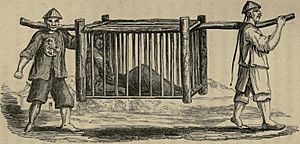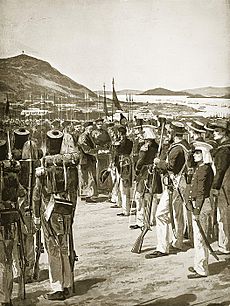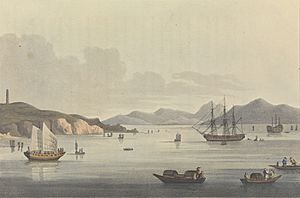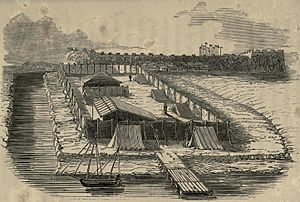Convention of Chuenpi facts for kids
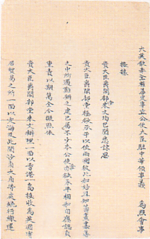
Page one of the convention
|
|
| Drafted | 20 January 1841 |
|---|---|
| Location | Humen, Guangdong, China |
| Condition | Unratified; superseded by the Treaty of Nanking (1842) |
| Negotiators |
|
| Convention of Chuenpi | |||||||||||||||||
|---|---|---|---|---|---|---|---|---|---|---|---|---|---|---|---|---|---|
| Traditional Chinese | 穿鼻草約 | ||||||||||||||||
| Simplified Chinese | 穿鼻草约 | ||||||||||||||||
|
|||||||||||||||||
The Convention of Chuenpi was an early agreement during the First Opium War. This war was fought between the United Kingdom and the Qing dynasty of China. The agreement was made between British representative Charles Elliot and Chinese official Qishan.
The terms of the agreement were announced on January 20, 1841. However, both governments rejected it. They also removed Elliot and Qishan from their jobs. The British Foreign Secretary, Lord Palmerston, felt Elliot got too little. The Chinese Daoguang Emperor thought Qishan gave away too much. Even though it was never officially approved, many of its ideas were later used in the Treaty of Nanking in 1842.
Contents
Why the Convention Was Needed
In February 1840, Lord Palmerston told British officials to get at least one island on the Chinese coast for trade. Captain Charles Elliot was the main British negotiator. In November 1840, his cousin Admiral George Elliot left due to illness. This left Charles in charge of talks.
Elliot wanted a place where the British could live and trade. He asked for a place "outside the sea" like Macao. By the end of 1840, they still had no agreement. To push for a deal, the British attacked and captured forts near Humen on January 7, 1841. After this, Qishan agreed to talk. The discussions happened near Chuenpi.
On January 11, Qishan offered a temporary lodging place. On January 15, he offered either Hong Kong Island or Kowloon. Elliot quickly accepted Hong Kong the next day. Some believed that Elliot thought the Chinese wording meant Britain would fully own Hong Kong. This was instead of just having a trading post there.
What the Agreement Said
On January 20, Elliot announced the main points of the agreement. These were the conditions they had agreed upon:
- China would give Hong Kong Island to Britain.
- China would pay Britain six million silver dollars. This was to cover the cost of the war.
- Official talks between Britain and China would be equal.
- The port of Canton (now Guangzhou) would open for trade within ten days.
Other parts of the agreement included giving back the islands of Chuenpi and Taikoktow to China. The British would also leave Chusan. British forces had captured Chusan in July 1840. Chusan was returned in exchange for British prisoners. These prisoners were shipwrecked near Ningpo in September 1840. The convention also said China could still collect taxes in Hong Kong. This tax issue was a big reason why Lord Palmerston disliked the agreement.
What Happened Next
On January 21, the forts were given back to the Chinese. A ceremony took place at Chuenpi. British flags were lowered, and Chinese flags were raised. Salutes were fired from ships and forts. Everyone seemed happy about the return of the forts.
Two days later, Elliot sent a ship to Chusan. It carried orders to leave Chusan and go to Hong Kong. Qishan also ordered the release of British prisoners in Ningpo. News of the agreement was sent to England.
On January 26, 1841, British officers officially took control of Hong Kong. They raised the British flag at Possession Point. This day is often seen as the start of modern Hong Kong.
A Special Meeting
On the same day, Elliot went to meet Qishan near Lotus Flower Hill. He had a guard of honor with 100 marines and a military band. As their ships passed, forts saluted them. The band played "God Save the Queen".
The next morning, Elliot and his group met Qishan. This was a big moment in Sino-British relations. It was the first time a high Chinese official met a British representative as an equal. They had a large meal with many dishes. Later, Elliot and an interpreter met Qishan privately. Qishan did not sign the agreement yet. He wanted to wait until Chusan was fully left by the British. That evening, the British ships put on a fireworks show for Qishan.
In February 1841, Qishan sent a report to the emperor. He explained that the forts were weak and easily blocked. He also said the guns were old and not well placed. He mentioned that Chinese soldiers were not used to fighting on ships. Qishan also noted that many Chinese people were used to foreigners. They often got along well with them.
Fighting Starts Again
On January 27, the emperor learned about the British taking the Bogue forts. He was very angry. He ordered Qishan to attack the British. This order reached Qishan on February 9. But Qishan did not attack. He kept meeting with Elliot, hoping for a peaceful solution.
One part of the agreement was to open Canton for trade by February 2. But this did not happen. Elliot and Qishan met again on February 11-12. They reached a new agreement. But Qishan asked for 10 more days before signing. Elliot agreed. Qishan was trying to delay things.
Meanwhile, Chinese troops and cannons were gathering. On February 13, Qishan received two important messages. The first was from the emperor. It said a large army was coming to Canton. New officials were appointed to lead the fight. The second was a letter from Elliot. He wanted to meet soon to sign the agreement. Qishan had no choice but to prepare for battle.
On February 16, Elliot said the British had left Chusan. He demanded Qishan sign the agreement. If not, attacks would start again. Qishan pretended to be sick to buy more time.
On February 19, a British ship returned without a reply from Qishan. It came under fire from a Chinese fort. Qishan sent a new offer. He said the British could have the whole island of Hong Kong. But Elliot felt that peaceful talks had failed. The next day, Elliot refused the new offer. The British then captured more forts from February 23-26. This allowed them to move towards Canton. They captured more forts on the Pearl River. After capturing Canton on March 18, trade was finally allowed to restart.
Leaders Removed From Power
After leaving Canton on March 12, Qishan faced serious charges in Peking. He was accused of giving Hong Kong to the British. He said he only pretended to do so to delay them. The court called him a traitor. He was sentenced to a severe punishment. After some time in prison, he was allowed to deal with the British again, but without his official rank.
On April 21, Lord Palmerston removed Elliot from his position. He thought Elliot had not followed his orders. He called Hong Kong "a barren island." In May 1841, Major-General Henry Pottinger took Elliot's place. Pottinger brought more warships and soldiers. Many parts of the Convention of Chuenpi were later included in the Treaty of Nanking in 1842. These included Britain getting Hong Kong, China paying money, and both countries being treated as equals.
Images for kids
 | Selma Burke |
 | Pauline Powell Burns |
 | Frederick J. Brown |
 | Robert Blackburn |


